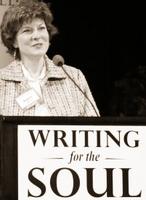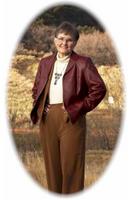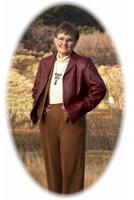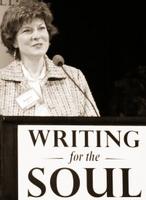
(Continued from previous date)
The second thing I’d like you to realize about dreams is that
they can make you focus on the wrong things.
As God promised, I
did travel and sing (with a group called the Re'Generation--anybody remember them?) and as I sang that year, I assumed my future would lie in music. After all, during that year we recorded albums, sang at Disney, performed over 500 concerts, and saw the country from sea to shining sea. Though I learned that life on the road can be tough, I still thought God’s plan for me was etched in stone and it looked like a musical score.
And then I experienced a Colorado blizzard—the storm of ’77, to be precise. My 12 fellow Re'Gen singers, three snow plow drivers, and a family of five, were trapped together in the Woods family's farmhouse in NE Colorado for four days with little food, no water, no power, no heat. It was an adventure for this Florida girl, and I filled my journal with stories of everyone using my toothbrush (I was the only ReGen girl with the foresight to bring her makeup kit!) and melting snow in the fireplace just to get water to flush the toilets.
I remember mixing pancake batter with melted snow and adding a drop of food coloring just for fun, then trying to bake the things in the fireplace. Not delicious, but hey, when you're hungry . . .
When we finally dug ourselves out (literally--the house was buried) and reconnected with our director, he read all of our journals. One night a few weeks later, he and I were talking and he said, "What are you going to do when you come off the road?" I shrugged and said I supposed I'd go back to school and get my degree in music ed. Then he said, "I read your blizzard journal and you really have a way with words. Why don't you think about writing?"
Hmmm. Because I believed that God speaks to us through the voices of our spiritual authorities, I listened. And when I went back to school, I changed my major to English. Didn't have a CLUE what I'd do with it.
Graduated from Liberty University on May 12, 1980, and got married the very next day. (My parents
did approve of my hubby). In those days I took whatever job I could get, so for a while I taught school, then I wrote curriculum for a church, then I became a secretary. Finally, on faith, I decided to step out and become a freelance writer.
Which brings me to my third point:
dreams can limit your vision.
In 1983 I began writing not because of a dream, but because my husband was a youth pastor, and I knew I would have to help pay bills. Very basic motivation. I also knew I wanted to work at home because I had a baby I couldn't bear to leave. So I "dreamed" of a freelance writing career, but honestly, I'd have been grateful for work I could get. I had business cards printed up and sent them out to all the advertising agencies in town . . . and waited.
To shorten a very long story, for five
years I wrote brochures, catalog copy, radio copy, and hundreds of magazine articles. Then one day I saw an ad about a contest for unpublished picture book writers. I had never published any kind of book, so I studied the picture book format (yes, there is one!) and wrote a story in about 20 minutes. Sent it off and tried to put it out of my mind.
Then one day I learned that my story won the contest. (I was flabbergasted.) I had never
dared to dream of writing books; I’d been happy just to help put food on the table. From picture books I moved into middle reader books, then my editor said, “Why not try adult novels?” and I shrugged and said, “Well . . . okay.” Now it’s 18 years later and I
think God wants me to be a novelist . . . but every day, every book, is different. "Expect the unexpected" isn't just my marketing slogan. It's my
life.
If you'll allow me to change gears for just a moment: A friend of mine, Karen Kingsbury, once shared the following story about her two children, Kelsey, six, and Tyler, three. Seems the family was coming home from church where they had heard a particularly hard-hitting message, and Kelsey was hammering her baby brother with spiritual truth. “Tyler, you need to decide about heaven and hell,” she told her brother, who sat calmly in his car seat with a pacifier in his mouth. “You need to make up your mind. Tell me, Tyler, which is it? Heaven or hell, where do you want to go?”
The little boy, who had been staring blankly at his sister, pulled out his plug and said, “Disneyland.”
I love that story because I think it exemplifies the challenge we writers face. Sometimes we want to talk about heaven and hell; our readers want to go to Disneyland. Even when reading nonfiction, they want to be entertained, and there’s nothing wrong with that.
Our challenge is figuring out how to inject serious truths into entertaining words.
But before the Spirit can use my books to inject truth into a reader’s life, I have to learn that truth myself. A couple of years ago I painted a quote on my office wall: “The act of writing is the act of discovering what you believe.” I write because writing forces me to find God’s answers to some of life’s most perplexing problems.
Through my stories, I’ve grappled with breast cancer, lost a son in a tragic accident, suffered from a rare and fatal brain disease, committed my child to a mental institution, dealt with a rebellious teenage daughter, grieved over infertility, lived as a prodigal, had my lover murdered, been attacked by a white supremacist, suffered from agoraphobia, given birth to a caveman’s baby, and fished for piranha in the Amazon—and that’s only in the last couple of years. And you know what? A third of those situations came from my
real life.
I never dreamed I’d write about any of those situations. Some of those experiences aren’t exactly what a sane woman dreams of, but I don’t regret either my fictional forays or my real life trials. Living through them has made me wiser . . . and much more sympathetic. My dreams were too small. God’s leading is tailor-made, a perfect fit. Sometimes he takes me through heavenly experiences; sometimes I'm glad this life is all I'll ever know of hell. And there
is the occasional trip to Disneyland . . .
So—in a country that thrives on Rocky movies and tales of underdogs, am I telling you that dreams are a waste of time? Not really. What I want you to see in this rambling history is that it’s far more important to walk humbly with God and align your dreams with his.
Remember that “fondest dream” I asked you to visualize yesterday? Now—which would you rather do—realize that dream or be what God wants you to be, no more and no less?
I’ve come to realize that while dreams are inspirational, they’re not nearly as important as obedience. Following the Lord’s leading far more important than jogging toward a distant dream that may not be part of His plan for you and me. If you commit your way to him, He will prepare you for whatever lies ahead. Just remain true to His Word, listen to the godly leaders He has placed in your path, and keep an ear tuned to that still, small voice.
The Spirit of God moved David to write:
You watched me as I was being formed in utter seclusion,
as I was woven together in the dark of the womb.
You saw me before I was born.
Every day of my life was recorded in your book.
Every moment was laid out
before a single day had passed.
Psalm 139:15-16
Our dreams can lead us in the wrong direction, make us focus on the wrong things, and limit us, but God says, “I know the plans I have for you . . . They are plans for good and not for disaster, to give you a future and a hope.”
I’ll take his plans over mine any day.
Angela Hunt lives and writes in Florida where it never snows. Too bad.
www.angelahuntbooks.com








